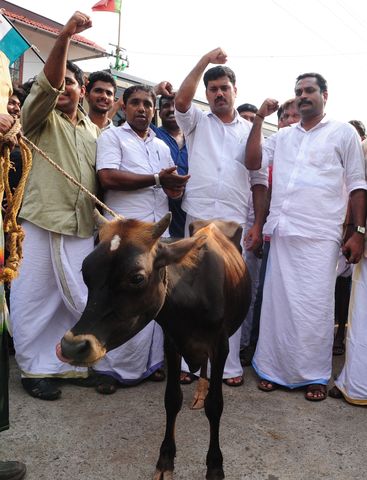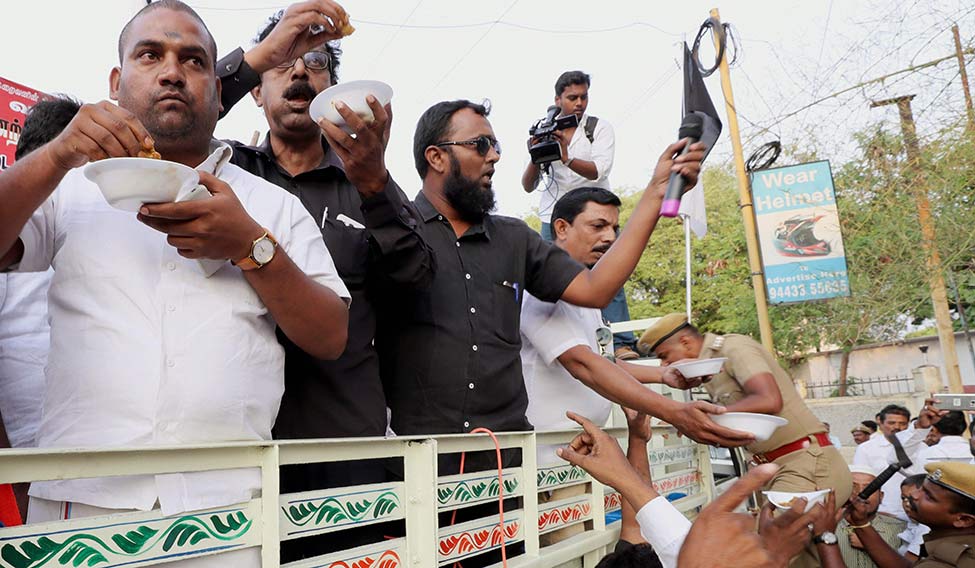Hari S. was a vegetarian till recently. The advertising professional from Kerala ate beef for the first time to protest the Union government’s move to ban the sale of cattle for slaughter in animal markets. “I strongly believe the government has no right to tell people what to eat,” he said. “Ours is a traditional Nair family where beef is still not cooked. My mother would be saddened if she knew that I ate beef. But, I did it to protest.”
Hari is a symbol of the protest raging on in the streets of Kerala, the biggest consumer of beef in the country. According to the state animal husbandry department, Kerala consumed 2.4 lakh tonnes of beef in 2015-16.
Most Malayalis love beef, irrespective of religion, and the ban has united them. On May 23, the day the decision was taken, Chief Minister Pinarayi Vijayan shot off a highly critical letter to Prime Minister Narendra Modi. “May I remind you that meat is the primary source of protein for millions of poor and ordinary people in this country, particularly dalits,” he wrote. Vijayan also wrote to his counterparts in other states asking them to join hands against the decision. The state government has decided to convene a meeting of all chief ministers in Thiruvananthapuram at the earliest.
The ban, however, was being prepped for months. On January 16, the environment ministry notified the draft Prevention of Cruelty to Animals (Regulation of Livestock Market) Rules. The draft was uploaded online and a copy was sent to the chief secretaries of all the states for their feedback. The ministry received 13 suggestions, which it says it incorporated in the document, but the draft was ignored by the states. So, when the ministry notified the rules on May 23, all hell broke loose. Several state governments came out against the ban. While West Bengal Chief Minister Mamata Banerjee said such a decision could not be taken unilaterally in a federal structure, DMK working president M.K. Stalin took out a rally in Chennai protesting the ban. Some of the BJP’s allies in the northeast, especially in Meghalaya and Nagaland, also opposed the decision. On May 30, the Madras High Court stayed the ban for a month.
However, no state was as aggressive in its opposition to the ban as Kerala, where the ruling Communist Party of India (Marxist) has been organising beef festivals with aplomb. The party would only gain by taking an aggressive stand as its traditional vote bank—mostly consisting of other backward classes and dalits—are beef eaters.
 No mercy: Youth Congress members publicly slaughtered a calf in Kannur on May 27 | M.T. Vidhuraj
No mercy: Youth Congress members publicly slaughtered a calf in Kannur on May 27 | M.T. Vidhuraj
The state Congress, however, found itself in a quandary. On May 27, some overzealous members of Youth Congress publicly slaughtered a calf in Kannur. There was severe backlash. Congress vice president Rahul Gandhi called the act “barbaric”, and the party expelled the youth leaders. It would be difficult for the Congress, as a national party, to take a combative stand on the issue. “The Congress has to deal with more issues unlike the BJP or the CPI(M) as our party believes in taking everyone along,” Deepak Babaria, Congress secretary in-charge of Kerala, told THE WEEK. “As a national party that believes in inclusiveness, we are determined to protect both individual freedom and religious sentiments.”
The state BJP, meanwhile, shook off its initial confusion about handling the issue and is now playing the cow card with abandon. It may be recalled that the BJP candidate in the recent Malappuram parliamentary byelection had offered “good beef” as an election promise. But now, the party has come out vehemently against the beef festivals. BJP state president Kummanam Rajasekharan had called the cow slaughter by the Youth Congress leaders “cruelty at its peak”.
The state government, meanwhile, is trying to circumvent the order through the legal route. Vijayan is said to have asked the law department to come up with a “way out” by early June, when an all-party meeting is expected to be held on the subject.
Animal rights activists, however, feel the state government is playing politics. “Why did the state not oppose the draft when it was sent in January?” asked N.G. Jayasimha, former member of the Animal Welfare Board of India. “If it had any issues, the law secretary of the state should have pointed it out. Even I am against beef ban. But what the government is trying to do with the notification—that too after huge pressure from animal rights groups—is to regulate the beef business.”
Politics aside, the decision would seriously affect Kerala’s meat industry. “Prices will go up and there will also be a lot of illegal slaughtering, which cannot be monitored,” said an official of Meat Products of India, a state-owned company that markets meat. He said that even if the state government resisted the regulation, it would affect the industry as 80 per cent of the cattle being slaughtered in Kerala is brought from other states, including Tamil Nadu, Andhra Pradesh and Odisha.
According to the official, beef consumption in Kerala has gone up three times in the past few years. The scare of hormone-injected poultry chicken might have triggered the love for beef. MPI produces 20,000kg of meat a month, but that accounts for only 1 per cent of the total beef consumption in the state.
“Beef has become a symbol of resistance for Malayalis,” said A. Sethumadhavan, former chairman of National Book Trust. “They love to make every issue a socio-political issue and they see the ban as an infringement on their freedom. They will oppose it.”
Union Environment Minister Harsh Vardhan, however, said the rules were only to ensure that animals were not sold for slaughter in the market; there was no other curb on sale. “It is for strengthening the hand of the government in preventing cruelty to animals,” he said. Cattle for slaughter have to be purchased directly from the farms; the market route to the slaughter house is banned to ensure ethical treatment.
Animal trade, without regulation, had meant transporting and keeping animals in terrible conditions. Sources even say the smuggling of livestock was funding terror networks through the Bangladesh route.
Officials at the environment ministry are now tightlipped on this subject, but even as they try to explain their stance off the record, several questions remained unanswered. Significantly, the ban excludes goats and sheep. The notification, days before the holy month of Ramadan, developed political colours within a short time. The excuse is that the trade in goats and sheep is much larger, and that including them in the rules would make regulation difficult and put almost all the butchers in the country out of work. “We have to start somewhere. Cattle was the low-hanging fruit,” said a source.
The rules are seen as yet another move to push the Rashtriya Swayamsevak Sangh agenda on protecting cows, but officials said this was not true. According to the ministry, the Animal Welfare Board of India drafted the rules on the directions of the Supreme Court, which passed an order on July 13, 2015, to frame guidelines to prevent animals from being smuggled out of India. Gauri Maulekhi had petitioned the court to prevent animals being taken from India for the Gadhimai Festival in Nepal, a fest of animal sacrifice.
On July 12, 2016, the court, in its final order, told the ministry to frame rules under Section 38 of the Prevention of Cruelty to Animals Act, 1960. Livestock regulation is otherwise a state subject; it was only under the Prevention of Cruelty to Animals Act that the Centre could intervene.
“Far from pushing a political agenda, the government was actually dragging its feet over the matter and we had to file a contempt of court plea before the ministry got proactive and drafted the rules,” said Jayasimha.
Singed by the beef-lash from Kerala and West Bengal, where the BJP is keen to make a presence, the government is now thinking of a rollback, keeping buffaloes out of the rule. This, however, is a Catch-22 situation, as its cow protection agenda would then get exposed. “The buffalo is a dark and unattractive animal; no one cares for its life. It will be the obvious sacrifice in this political fight,” said Jayasimha.







